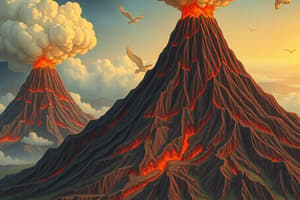Podcast
Questions and Answers
Where are most of Earth's volcanoes found?
Where are most of Earth's volcanoes found?
Volcanic belts form along the boundaries of Earth's plates.
How do hot spot volcanoes form?
How do hot spot volcanoes form?
A volcano forms above a hot spot when magma erupts through the crust and reaches the surface.
What is a volcano?
What is a volcano?
A weak spot in the crust where molten material or magma comes to the surface.
Where are most volcanoes located?
Where are most volcanoes located?
What is a hot spot?
What is a hot spot?
What features form as an oceanic plate moves across a hot spot?
What features form as an oceanic plate moves across a hot spot?
Why is it helpful to know the physical and chemical properties of a substance?
Why is it helpful to know the physical and chemical properties of a substance?
What causes some liquids to flow more easily than others?
What causes some liquids to flow more easily than others?
What factors determine the viscosity of magma?
What factors determine the viscosity of magma?
How hot are magma and lava?
How hot are magma and lava?
What is a physical property?
What is a physical property?
What is a chemical property?
What is a chemical property?
Is the boiling point of a substance a physical property or a chemical property?
Is the boiling point of a substance a physical property or a chemical property?
Which of these characteristics are physical properties of magma?
Which of these characteristics are physical properties of magma?
What is viscosity?
What is viscosity?
Which has a higher viscosity, a fast-flowing liquid or a slow-flowing liquid?
Which has a higher viscosity, a fast-flowing liquid or a slow-flowing liquid?
What can you infer about the amount of friction among the particles of a liquid that has low viscosity?
What can you infer about the amount of friction among the particles of a liquid that has low viscosity?
What two main factors affect magma's viscosity?
What two main factors affect magma's viscosity?
How does a lava flow cool as it moves away from the vent?
How does a lava flow cool as it moves away from the vent?
Which type of lava has lower viscosity?
Which type of lava has lower viscosity?
What happens when a volcano erupts?
What happens when a volcano erupts?
What are the two types of volcanic eruptions?
What are the two types of volcanic eruptions?
What are a volcano's stages of activity?
What are a volcano's stages of activity?
What is Pele's hair?
What is Pele's hair?
What does lava begin as?
What does lava begin as?
What happens to the pressure in magma as it rises toward the surface?
What happens to the pressure in magma as it rises toward the surface?
How does a volcano form?
How does a volcano form?
Flashcards are hidden until you start studying
Study Notes
Volcanoes Overview
- Most volcanoes are located along tectonic plate boundaries.
- The Ring of Fire is a significant volcanic belt surrounding the Pacific Ocean.
Volcano Formation
- Hot spot volcanoes form when magma penetrates the Earth's crust, erupting to the surface.
- A volcano is defined as a weak spot in the crust that allows molten material, or magma, to emerge.
Characteristics of Hot Spots
- A hot spot is an area where magma rises from deep within the mantle.
- Moving oceanic plates across hot spots can create a chain of volcanic mountains.
Physical and Chemical Properties
- Each substance has unique physical and chemical properties, aiding in identification and behavior prediction.
- Physical properties can be observed without altering the substance, while chemical properties result in a change in composition.
Viscosity of Magma
- Viscosity refers to a liquid's resistance to flow; it varies among different liquids.
- Magma's viscosity is influenced by silica content and temperature.
- Higher silica content and lower temperatures increase magma's viscosity.
Temperature of Magma and Lava
- Lava temperatures range from 700°C to 1200°C; it can retain heat for long periods.
- Magma can retain heat for thousands to millions of years.
Types of Lava
- Pahoehoe lava has lower viscosity, flows easily, and forms a smooth, rippled surface.
- Aa lava has higher viscosity, hardens into rough chunks.
Eruption Dynamics
- During an eruption, expanding gases propel magma from the magma chamber through the pipe, leading to flow or explosive outbursts.
- Eruptions can be classified as quiet or explosive based on geologists' observations.
Stages of Volcanic Activity
- Vulcanologists categorize volcanoes as active, dormant, or extinct based on their activity levels.
Unique Volcanic Features
- "Pele's hair" is a glass-like rock formed from lava, consisting of fine, spun strands.
Other Characteristics
- As magma rises toward the surface, pressure builds up; the eruption occurs due to the gas expansion.
- A volcano forms when magma breaks through the Earth's crust and is released as lava.
Studying That Suits You
Use AI to generate personalized quizzes and flashcards to suit your learning preferences.




